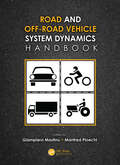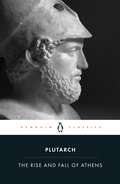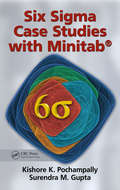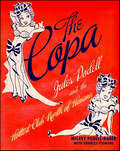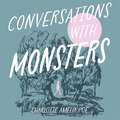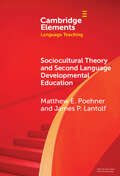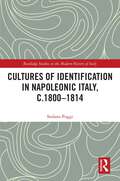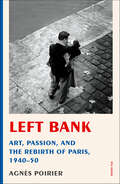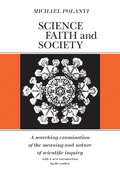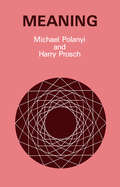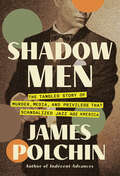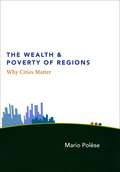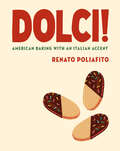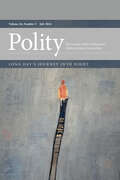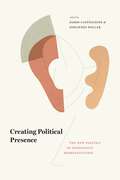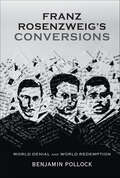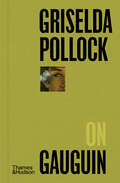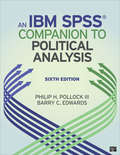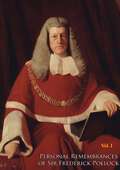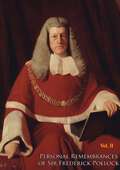- Table View
- List View
Road and Off-Road Vehicle System Dynamics Handbook
by Manfred Ploechl Giampiero MastinuFeaturing contributions from industry leaders in their respective fields, this volume presents comprehensive, authoritative coverage of all the major issues involved in road vehicle dynamic behavior. It begins with a short history of road and off-road vehicle dynamics followed by thorough, detailed state-of-the-art chapters on modeling, analysis and optimization in vehicle system dynamics, vehicle concepts and aerodynamics, pneumatic tires and contact wheel-road/off-road, modeling vehicle subsystems, vehicle dynamics and active safety, man-vehicle interaction, intelligent vehicle systems, and road accident reconstruction and passive safety.
Accelerating Health Care Transformation with Lean and Innovation: The Virginia Mason Experience
by Paul E. PlsekAccelerating Health Care Transformation with Lean and Innovation: The Virginia Mason Experience describes how Virginia Mason Medical Center (VMMC) has systematically integrated innovative structures, methods, and cultural practices into its implementation of Lean. Describing how an organization can create a strategy and build a culture of innovation and learning, it supplies concrete examples that show how Lean and innovation can work hand-in-hand to improve and transform value streams. It also explains how to use the voices of patients and their families to drive improvement and innovation.
The Rise And Fall of Athens: Nine Greek Lives
by PlutarchPlutarch traces the fortunes of Athens through nine lives - from Theseus, its founder, to Lysander, its Spartan conqueror - in this seminal workWhat makes a leader? For Plutarch the answer lay not in great victories, but in moral strengths. In these nine biographies, taken from his Parallel Lives, Plutarch illustrates the rise and fall of Athens through nine lives, from the legendary days of Theseus, the city's founder, through Solon, Themistocles, Aristides, Cimon, Pericles, Nicias and Alcibiades, to the razing of its walls by Lysander. Plutarch ultimately held the weaknesses of its leaders responsible for the city's fall. His work is invaluable for its imaginative reconstruction of the past, and profound insights into human life and achievement. This edition of Ian Scott-Kilvert's seminal translation, fully revised with a new introduction and notes by John Marincola, now also contains Plutarch's attack on the first historian, 'On the Malice of Herodotus'.
Six Sigma Case Studies with Minitab
by Kishore K. Pochampally Surendra M. GuptaSix Sigma is one of the most widely used quality improvement methodologies today, both in manufacturing and service industries. Minitab is a statistical software package that is often used in conjunction with Six Sigma projects. This book illustrates the application of Minitab for Six Sigma projects, using case studies in a variety of sectors, such as healthcare, manufacturing, airline, and fast food. Detailed steps and screenshots are provided to explain how to use a number of quality analysis and improvement tools in Minitab. Figures will include Minitab screenshots and Minitab worksheets for the case studies will be available for download.
Sing Her Down: A Novel
by Ivy Pochoda“Urgent, haunting, and fearless.” —Megan Abbott, author of Beware the Woman“Sing Her Down hits like a shotgun blast.” —Dennis Lehane, author of Small MerciesCormac McCarthy meets Killing Eve in this gritty, razor-sharp thriller following two indelible women on a path to certain destructionWith blistering, incisive prose, the award-winning author Ivy Pochoda delivers a fast-paced L.A. crime novel for the ages. Gripping and immersive, Sing Her Down is a spellbinding thriller that, at its core, shows just what an angry woman is capable of.Florence “Florida” Baum is not the hapless innocent she claims to be when she arrives at the Arizona women’s prison—or so her ex-cellmate Diosmary Sandoval keeps insinuating.Dios knows the truth about Florida’s crimes, understands what Florence hides even from herself: that she was never a victim of circumstance, an unlucky bystander misled by a bad man. Dios knows that darkness lives in women too, despite the world’s refusal to see it. And she is determined to open Florida’s eyes and unleash her true self.When an unexpected reprieve gives both women their freedom, Dios’s fixation on Florida turns into a dangerous obsession, and a deadly cat-and-mouse chase ensues from Arizona to the desolate streets of Los Angeles.
The Copa: Jules Podell and the Hottest Club North of Havana
by Mickey Podell-Raber Charles PignoneThis beautifully illustrated history of Jules Podell's legendary club Copacabana features colorful characters, romance, and intrigue from the golden age of nightclubs.In this fascinating look behind the scenes of one of the world's most legendary nightclubs, the story of the Copa begins and ends with its fiery owner, Jules Podell. A Russian immigrant, Jules dropped out of the fourth grade to make money for his family and went on to create the number one destination for the rich, famous, and dangerous of New York. All the legends of the fifties and early sixties stood on his stage, including Frank Sinatra, Dean Martin, Jerry Lewis, Nat King Cole, Peggy Lee, Tony Bennett, Bobby Darin, Tom Jones, Sam Cooke, Johnny Mathis, and the Temptations. This book, which includes the Podell family's never-before-seen photos, menus, and club memorabilia, as well as interviews, allows us to truly get a peek at the Copa and its great moment in New York history.
Conversations with Monsters: On Mortality, Creativity, And Neurodivergent Survival
by Charlotte Amelia PoeHow does autistic trauma really feel, and how can you find your way through it to a warmer, brighter place?Written by best-selling author Charlotte Amelia Poe this is a poignant and whimsical exploration of the true autistic experience. Chapter-by-chapter, Poe delicately peels back the layers of what it is to be young and autistic in the modern world, touching on trauma, grief, mortality, love and everything in between.Charming, thought-provoking and often very funny, this book doesn't offer solutions - it walks next to you, like a friend, through times both dark and light. It reminds you every step that you're not alone.
Sociocultural Theory and Second Language Developmental Education (Elements in Language Teaching)
by null Matthew E. Poehner null James P. LantolfSociocultural Theory (SCT), as formulated by Russian psychologist L. S. Vygotsky nearly a century ago, is distinct among traditions in the field of second language (L2) studies in its commitment to praxis. According to this view, theory and research provide the orienting basis for practice, which in turn serves as a testing ground for theory (Vygotsky, 1997). This Element offers a synthesis of foundational concepts and principles of SCT and an overview of two important areas of praxis in L2 education: Concept-Based Language Instruction, which organizes language curricula around linguistic concepts, and Dynamic Assessment, a framework that integrates teaching and diagnosing learner L2 abilities. Leading approaches to L2 teacher education informed by SCT are also discussed. Examples from studies with L2 teachers and learners showcase praxis in action, and emerging questions and directions are considered.
Cultures of Identification in Napoleonic Italy, c.1800–1814 (Routledge Studies in the Modern History of Italy)
by Stefano PoggiThrough the lens of identification procedures, this book examines how the processes of state-building affected European societies during the Napoleonic period. By focusing on the Kingdom of Italy, the author shows how the top-down change usually associated with Napoleonic state-building had to compete and share spaces with the agencies of other often-neglected actors such as local bureaucrats, the clergy, and common people.What emerges is the coexistence of different understandings of personal identities, defined as “cultures of identification”. One was rooted in the traditional habits of the population and based on a continuous performance of identities, allowing for a certain degree of fluidity. The other, promoted by the Napoleonic administration, envisaged legal and fixed identities that were to be managed directly by agents of the state. Personal identification in Napoleonic Italy was thus more of a battleground than a mere field of action for the “modernizing” activities of state authorities.Analyzing a period of momentous change for European societies, Cultures of Identification can be profitably read by students and researchers interested in the history of state-building, policing, social control, and personal identification.
Nanocomposite and Nanocrystalline Materials and Coatings: Microstructure, Properties and Applications (Advanced Structured Materials #214)
by Alexander D. Pogrebnjak Yang Bing Martin SahulThis book is a collection of reports (reviewed) selected from several sections of the IEEE Nanomaterials: Application and Properties-2023 conference. The book is devoted to the study of films, coatings, and materials obtained by various methods of preparation and deposition, for example, magnetron sputtering of targets, vacuum arc deposition , electron-plasma processing, sintering of composites, plasma jet deposition, and other methods for obtaining nanomaterials. The chapters and reports describe superhard coatings, spark, and plasma alloying of materials (metals, semiconductors, polymers, ceramics).
Left Bank: Art, Passion, and the Rebirth of Paris, 1940–50
by Agnès PoirierAn incandescent group portrait of the midcentury artists and thinkers whose lives, loves, collaborations, and passions were forged against the wartime destruction and postwar rebirth of ParisIn this fascinating tour of a celebrated city during one of its most trying, significant, and ultimately triumphant eras, Agnes Poirier unspools the stories of the poets, writers, painters, and philosophers whose lives collided to extraordinary effect between 1940 and 1950. She gives us the human drama behind some of the most celebrated works of the 20th century, from Richard Wright’s Native Son, Simone de Beauvoir's The Second Sex, and James Baldwin's Giovanni's Room to Samuel Beckett's Waiting for Godot and Saul Bellow's Augie March, along with the origin stories of now legendary movements, from Existentialism to the Theatre of the Absurd, New Journalism, bebop, and French feminism.We follow Arthur Koestler and Norman Mailer as young men, peek inside Picasso’s studio, and trail the twists of Camus's Sartre's, and Beauvoir’s epic love stories. We witness the births and deaths of newspapers and literary journals and peer through keyholes to see the first kisses and last nights of many ill-advised bedfellows. At every turn, Poirier deftly hones in on the most compelling and colorful history, without undermining the crucial significance of the era. She brings to life the flawed, visionary Parisians who fell in love and out of it, who infuriated and inspired one another, all while reconfiguring the world's political, intellectual, and creative landscapes. With its balance of clear-eyed historical narrative and irresistible anecdotal charm, Left Bank transports readers to a Paris teeming with passion, drama, and life.
Science, Faith and Society: A searching examination of the meaning and nautre of scientific inquiry
by Michael PolanyiIn its concern with science as an essentially human enterprise, Science, Faith and Society makes an original and challenging contribution to the philosophy of science. On its appearance in 1946 the book quickly became the focus of controversy. Polanyi aims to show that science must be understood as a community of inquirers held together by a common faith; science, he argues, is not the use of "scientific method" but rather consists in a discipline imposed by scientists on themselves in the interests of discovering an objective, impersonal truth. That such truth exists and can be found is part of the scientists' faith. Polanyi maintains that both authoritarianism and scepticism, attacking this faith, are attacking science itself.
Meaning
by Michael Polanyi Harry ProschPublished very shortly before his death in February 1976, Meaning is the culmination of Michael Polanyi's philosophic endeavors. With the assistance of Harry Prosch, Polanyi goes beyond his earlier critique of scientific "objectivity" to investigate meaning as founded upon the imaginative and creative faculties. Establishing that science is an inherently normative form of knowledge and that society gives meaning to science instead of being given the "truth" by science, Polanyi contends here that the foundation of meaning is the creative imagination. Largely through metaphorical expression in poetry, art, myth, and religion, the imagination is used to synthesize the otherwise chaotic and disparate elements of life. To Polanyi these integrations stand with those of science as equally valid modes of knowledge. He hopes this view of the foundation of meaning will restore validity to the traditional ideas that were undercut by modern science. Polanyi also outlines the general conditions of a free society that encourage varied approaches to truth, and includes an illuminating discussion of how to restore, to modern minds, the possibility for the acceptance of religion.
Shadow Men: The Tangled Story of Murder, Media, and Privilege That Scandalized Jazz Age America
by James PolchinFrom Edgar Award finalist James Polchin comes a thrilling examination of the murder that captivated Jazz Age America, with echoes of the decadence and violence of The Great GatsbyOn the morning of May 16, 1922, a young man&’s body was found on a desolate road in Westchester County. The victim was penniless ex-sailor Clarence Peters. Walter Ward, the handsome scion of the family that owned the largest chain of bread factories in the country, confessed to the crime as an act of self-defense against a violent gang of &“shadow men,&” blackmailers who extorted their victims&’ moral weaknesses. From the start, one question defined the investigation: What scandalous secret could lead Ward to murder?For sixteen months, the media fueled a firestorm of speculation. Unscrupulous criminal attorneys, fame-seeking chorus girls, con artists, and misogynistic millionaires harnessed the power of the press to shape public perception. New York governor and future presidential candidate Al Smith and editor of the Daily News Joseph Medill Patterson leveraged the investigation to further professional ambitions. Famous figures like Harry Houdini, Arthur Conan Doyle, and F. Scott Fitzgerald weighed in. As the bereaved working-class Peters family sought to bring the callous Ward to justice, America watched enraptured.Capturing the extraordinary twists and turns of the case, Shadow Men conjures the excess and contradictions of the Jazz Age and reveals the true-crime origins of the media-led voyeurism that reverberates through contemporary life. It&’s a story of privilege and power that lays bare the social inequity that continues to influence our system of justice.
The Wealth & Poverty of Regions: Why Cities Matter
by Mario PolèseAs the world becomes more interconnected through travel and electronic communication, many believe that physical places will become less important. But as Mario Polèse argues in The Wealth and Poverty of Regions, geography will matter more than ever before in a world where distance is allegedly dead.This provocative book surveys the globe, from London and Cape Town to New York and Beijing, contending that regions rise—or fall—due to their location, not only within nations but also on the world map. Polèse reveals how concentrations of industries and populations in specific locales often result in minor advantages that accumulate over time, resulting in reduced prices, improved transportation networks, increased diversity, and not least of all, “buzz”—the excitement and vitality that attracts ambitious people. The Wealth and Poverty of Regions maps out how a heady mix of size, infrastructure, proximity, and cost will determine which urban centers become the thriving metropolises of the future, and which become the deserted cities of the past. Engagingly written, the book provides insight to the past, present, and future of regions.
Dolci!: American Baking with an Italian Accent: A Cookbook
by Renato Poliafito Casey ElsassRecipes that capture the flavors of la dolce vita, from Bologna to Brooklyn—Italian and Italian American-ish cakes, cookies, pies, and pastries, from the James Beard Award–nominated brains behind one of America&’s best bakeriesA joyous celebration of Italian, American, and Italian American tastes and traditions, Dolci! is a compendium of molto delizioso baked goods from both sides of the Atlantic. In almost a hundred recipes, James Beard–nominated baker Renato Poliafito pays homage to pastries of the Old World and the New—with perfected versions of classics like Pastiera and Torta Caprese, Honey-Ricotta Black and Whites, and Butter Cookies.Poliafito puts his own unique spin on the baking traditions of both countries with recipes of his own invention that are a mashup of Italian flavors and American innovation. Think Aperol Spritz Cake, Italian Krispie Treats, Malted Tiramisu, Panettone Bread Pudding, and Mocha Orange Whoopie Pies. In addition to the many cakes, pies, tarts, and cookies, Poliafito also shares a host of savory recipes: Sourdough Focaccias, Perfect Grissini, Cacio e Pepe Arancini—and for good measure, Italian-inflected cocktails (Amaro Root Beer Float!). A vibrant comingling of two great culinary cultures filtered through the mind of an American with the heart of an Italian, Dolci! hits the sweet spot between Italian and American baking.
Polity, volume 56 number 3 (July 2024)
by PolityThis is volume 56 issue 3 of Polity. Polity, the journal of the Northeastern Political Science Association, has been published quarterly since 1968. Among the leading general-interest journals in political science, Polity is guided by the premise that political knowledge advances through scholarly exchange across subfield boundaries and even beyond disciplinary borders. Polity publishes original research on all aspects of political life, especially those that converge around questions of race, gender, class, colonialism, and empire.
Creating Political Presence: The New Politics of Democratic Representation
by Johannes Pollak Dario CastiglioneFor at least two centuries, democratic representation has been at the center of debate. Should elected representatives express the views of the majority, or do they have the discretion to interpret their constituents’ interests? How can representatives balance the desires of their parties and their electors? What should be done to strengthen the representation of groups that have been excluded from the political system? Representative democracy itself remains frequently contested, regarded as incapable of reflecting the will of the masses, or inadequate for today’s global governance. Recently, however, this view of democratic representation has been under attack for its failure to capture the performative and constructive elements of the process of representation, and a new literature more attentive to these aspects of the relationship between representatives and the represented has arisen. In Creating Political Presence, a diverse and international group of scholars explores the implications of such a turn. Two broad, overlapping perspectives emerge. In the first section, the contributions investigate how political representation relates to empowerment, either facilitating or interfering with the capacity of citizens to develop autonomous judgment in collective decision making. Contributions in the second section look at representation from the perspective of inclusion, focusing on how representative relationships and claims articulate the demands of those who are excluded or have no voice. The final section examines political representation from a more systemic perspective, exploring its broader environmental conditions and the way it acquires democratic legitimacy.
Everyday Evil in Stephen King's America: Essays, Images, Paratexts
by Jason S Polley Stephanie Laine HamiltonThis edited collection variously interrogates how everyday evil manifests in Stephen King’s now-familiar American imaginary; an imaginary that increases the representational limits of both anticipated and experienced realism. Divided into three parts: I. The Man, II. The Monster, and III. The Re-mediator, the book offers rigorous readings of evil, realism, and popular culture as represented in a range of texts (and paratexts) from the King canon. Rich with images, a photo-essay, and appendices collecting classical texts and cultural detritus germane to King, this book moves away from viewing King’s work primarily through the lens of the “American gothic” and toward the realism that the suspense novelist’s voice (fictional and non-) and influence (literary and popular) indelibly continue to amplify, all the while complicating the traditional divide between serious literature and popular fiction.Stephen King remains perpetually popular. And he is finally receiving the academic treatment he has craved since the early 1980s. Yet still unexamined in the King critical canon is the suspense novelist’s fascination with “everyday evil.” Beyond rigorous interrogations of King’s fictional depictions of “everyday evil” by an array of scholars of different ranks living around the world (Canada, Finland, Hong Kong, the UK), the book, replete with 20 images, considers how King widens the parameters of literary production and appreciation. An integral part of the Americana that King’s five-decades-in-the-making canon configures, of course, includes King himself. King has long made use of self-referentiality in his fiction and nonfiction. Some of his nonfiction, several of our essays reveal, recirculates in paratextual form as “Prefatory Remarks” to new novels or new editions of older ones. The paratexts considered here (both across the volume and in the appendices) offer alternate ways by which to appreciate King and his sphere of influence (literary and popular). Said appendices are a grouping of King's paratexts on his writing as Bachman, appearing here, for the first time, as a cohesive collection. King's influence took off in the 1970s, as is further explored in the book-enveloping three-part photo-essay “King’s America, America’s King: Stephen King & Popular Culture since the 1970s.” About the transformative quality of “everyday evil,” the photo-essay tracks the cultural impacts of King first as an emerging author, then a pop culture phenomenon, and, finally, as an established American literary voice.Everyday Evil in Stephen King's America is designed to appeal to teachers and students of American literature, to Stephen King enthusiasts, as well as to acolytes of Americana since the Vietnam War.
Franz Rosenzweig's Conversions: World Denial and World Redemption
by Benjamin PollockFranz Rosenzweig's near-conversion to Christianity in the summer of 1913 and his subsequent decision three months later to recommit himself to Judaism is one of the foundational narratives of modern Jewish thought. In this new account of events, Benjamin Pollock suggests that what lay at the heart of Rosenzweig's religious crisis was not a struggle between faith and reason, but skepticism about the world and hope for personal salvation. A close examination of this important time in Rosenzweig's life, the book also sheds light on the full trajectory of his philosophical development.
Griselda Pollock on Gauguin (Pocket Perspectives #6)
by Griselda PollockGriselda Pollock, feminist art historian and longstanding advocate of gender and racial inclusivity, unpacks the racist, sexist, and imperialist underpinnings of works created by Gauguin and others as they competed for preeminence in the European artistic avant-garde of the 1880s and '90s. Surprising, questioning, challenging, enriching: the Pocket Perspectives series presents timeless works by writers and thinkers who have shaped the conversation across the arts, visual culture, and history. Celebrating the undiminished vitality of their ideas today, these covetable and collectable little books embody the best of Thames & Hudson.
An IBM® SPSS® Companion to Political Analysis
by Philip H. Pollock Barry Clayton Edwards"[The text] provides by far the best introduction for students wanting to learn how to use SPSS in conducting statistical analysis. Its clear in-depth examples makes data analysis accessible to even the most numbers-phobic student." —Michael Burch, Eckerd College In Pollock′s trusted IBM SPSS® workbook, students dive headfirst into actual political data and work with a software tool that prepares them not only for future political science research, but the job world as well. Students learn by doing with new guided examples, annotated screenshots, step-by-step instructions, and exercises that reflect current scholarly debates in American political behavior and comparative politics. This Sixth Edition of An IBM SPSS® Companion to Political Analysis features thoroughly revised and updated datasets and is compatible with all post-12 releases of SPSS. Give your students the SAGE edge! SAGE edge offers a robust online environment featuring an impressive array of free tools and resources for review, study, and further exploration, keeping both instructors and students on the cutting edge of teaching and learning.
An IBM® SPSS® Companion to Political Analysis
by Philip H. Pollock Barry Clayton Edwards"[The text] provides by far the best introduction for students wanting to learn how to use SPSS in conducting statistical analysis. Its clear in-depth examples makes data analysis accessible to even the most numbers-phobic student." —Michael Burch, Eckerd College In Pollock′s trusted IBM SPSS® workbook, students dive headfirst into actual political data and work with a software tool that prepares them not only for future political science research, but the job world as well. Students learn by doing with new guided examples, annotated screenshots, step-by-step instructions, and exercises that reflect current scholarly debates in American political behavior and comparative politics. This Sixth Edition of An IBM SPSS® Companion to Political Analysis features thoroughly revised and updated datasets and is compatible with all post-12 releases of SPSS. Give your students the SAGE edge! SAGE edge offers a robust online environment featuring an impressive array of free tools and resources for review, study, and further exploration, keeping both instructors and students on the cutting edge of teaching and learning.
Personal Remembrances of Sir Frederick Pollock, Second Baronet, sometime Queen's Remembrancer Vol. I (Personal Remembrances of Sir Frederick Pollock #1)
by Sir Frederick Pollock"Personal Remembrances of Sir Frederick Pollock" offers an intimate glimpse into the life and times of one of the most distinguished legal scholars and historians of the 19th century. Sir Frederick Pollock, a prominent figure in English law, shares his personal recollections and experiences in this engaging memoir, providing readers with a rich tapestry of his professional achievements and personal anecdotes.The book chronicles Pollock's illustrious career as a barrister, judge, and legal writer, shedding light on his contributions to the development of common law and his influential role in legal education. Pollock's reminiscences are filled with vivid descriptions of his interactions with notable contemporaries, offering unique insights into the intellectual and social circles of Victorian England.Beyond his professional accomplishments, Pollock's memoir delves into his personal life, revealing the man behind the esteemed jurist. He reflects on his friendships, family, and the events that shaped his worldview. His narrative is characterized by wit, wisdom, and a deep appreciation for the nuances of human nature and society."Personal Remembrances of Sir Frederick Pollock" is more than just an autobiography; it is a historical document that captures the spirit of an era. Through Pollock's eloquent prose, readers are transported to a time of profound legal and social transformation. This book is an invaluable resource for historians, legal scholars, and anyone interested in the life of a remarkable figure whose legacy continues to influence the field of law.With its blend of personal reflection and historical context, "Personal Remembrances of Sir Frederick Pollock" provides a compelling portrait of a man who left an indelible mark on the legal landscape and offers timeless wisdom that resonates to this day.
Personal Remembrances of Sir Frederick Pollock, Second Baronet, sometime Queen's Remembrancer Vol. II (Personal Remembrances of Sir Frederick Pollock #2)
by Sir Frederick Pollock"Personal Remembrances of Sir Frederick Pollock" offers an intimate glimpse into the life and times of one of the most distinguished legal scholars and historians of the 19th century. Sir Frederick Pollock, a prominent figure in English law, shares his personal recollections and experiences in this engaging memoir, providing readers with a rich tapestry of his professional achievements and personal anecdotes.The book chronicles Pollock's illustrious career as a barrister, judge, and legal writer, shedding light on his contributions to the development of common law and his influential role in legal education. Pollock's reminiscences are filled with vivid descriptions of his interactions with notable contemporaries, offering unique insights into the intellectual and social circles of Victorian England.Beyond his professional accomplishments, Pollock's memoir delves into his personal life, revealing the man behind the esteemed jurist. He reflects on his friendships, family, and the events that shaped his worldview. His narrative is characterized by wit, wisdom, and a deep appreciation for the nuances of human nature and society."Personal Remembrances of Sir Frederick Pollock" is more than just an autobiography; it is a historical document that captures the spirit of an era. Through Pollock's eloquent prose, readers are transported to a time of profound legal and social transformation. This book is an invaluable resource for historians, legal scholars, and anyone interested in the life of a remarkable figure whose legacy continues to influence the field of law.With its blend of personal reflection and historical context, "Personal Remembrances of Sir Frederick Pollock" provides a compelling portrait of a man who left an indelible mark on the legal landscape and offers timeless wisdom that resonates to this day.
